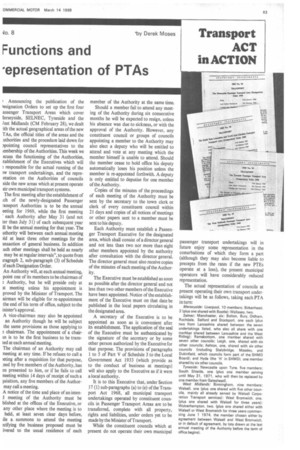Functions and
Page 65

If you've noticed an error in this article please click here to report it so we can fix it.
.epresentation of PTAs
■ Announcing the publication of the lesignation Orders to set up the first four assenger Transport Areas which cover Ierseyside, SELNEC, Tyneside and the Test Midlands (CM February 28), we dealt ith the actual geographical areas of the new TAs, the official titles of the areas and the uthorities and the procedure laid down for pointing council representatives to the Lembership of the Authorities, This week we scuss the functioning of the Authorities, tablishment of the Executives which will responsible for the actual running of the :w transport undertakings, and the repre ntation on the Authorities of councils side the new areas which at present operate eir own municipal transport systems.
The first meeting after the establishment of .ch of the newly-designated Passenger -ansport Authorities is to be the annual
eeting for 1969, while the first meeting each Authority after May 31 (and not ter than July 31) of each subsequent year ill be the annual meeting for that year. The uthority will between each annual meeting Ad at least three other meetings for the insaction of general business. In addition uch other meetings shall be held as nearly may be at regular intervals", to quote from tragraph 2, sub-paragraph (3) of Schedule )f each Designation Order.
An Authority will, at each annual meeting, point one of its members to be chairman of ! Authority, but he will preside only at St meeting unless his appointment is proved by the Minister of Transport. The airman will be eligible for re-appointment the end of his term of office, subject to the Mister's approval.
A vice-chairman may also be appointed an Authority though he will be subject the same provisions as those applying to chairman. The appointment of a chairin is to be the first business to be transted at each annual meeting.
The chairman of an Authority may call -fleeting at any time. If he refuses to call a
;eting after a requisition for that purpose, ned by five members of the Authority, has an presented to him, or if he fails to call fleeting within 14 days of receipt of such a tuisition, any five members of the Authormay call a meeting.
A notice of the time and place of an inten i meeting of the Authority must he blished at the offices of the Executive, or any other place where the meeting is to held, at least seven clear days before, ile a summons to attend the meeting :cifying the business proposed must be ivered to the usual residence of each member of the Authority at the same time.
Should a member fail to attend any meeting of the Authority during six consecutive months he will be expected to resign, unless his absence was due to sickness, or with the approval of the Authority. However, any constituent council or groups of councils appointing a member to the Authority may also elect a deputy who will be entitled to attend and vote at any meeting which the member himself is unable to attend. Should the member cease to hold office his deputy automatically loses his position unless the member is re-appointed forthwith. A deputy is only entitled to deputise for one member of the Authority.
Copies of the minutes of the proceedings of each meeting of the Authority must be sent by the secretary to the town clerk or clerk of every constituent council within 21 days and copies of all notices of meetings or other papers sent to a member must be sent to his deputy.
Each Authority must establish a Passenger Transport Executive for the designated area, which shall consist of a director general and not less than two nor more than eight other members appointed by the authority after consultation with the director general. The director general must also receive copies of the minutes of each meeting of the Authority.
The Executive must be established as soon as possible after the director general and not less than two other members of the Executive have been appointed. Notice of the establishment of the Executive must on that date be published in the local papers circulating in the designated area.
A secretary of the Executive is to be appointed as soon as is convenient after its establishment. The application of the seal of the Executive must be authenticated by the signature of the secretary or by some other person authorized by the Executive for that purpose. The provisions of paragraphs 1 to 5 of Part V of Schedule 3 to the Local Government Act 1933 (which provide as to the conduct of business at meetings) will also apply to the Executive as if it were a local authority.
It is to this Executive that, under Section 17(1) sub-paragraphs (a) to (e) of the Transport Act 1968, all municipal transport undertakings operated by constituent councils in Passenger Transport Areas are to be transferred, complete with all property, rights and liabilities, under orders yet to be made by the Minister of Transport.
While the constituent councils which at present do not operate their own municipal passenger transport undertakings will in future enjoy some representation in the conurbations of which they form a part (although they may also become liable to precepts from the rates if the new PTEs operate at a loss), the present municipal operators will have considerably reduced representation.
The actual representation of councils at present operating their own transport undertakings will be as follows, taking each PTA in turn:




















































































































